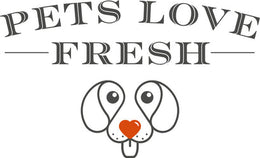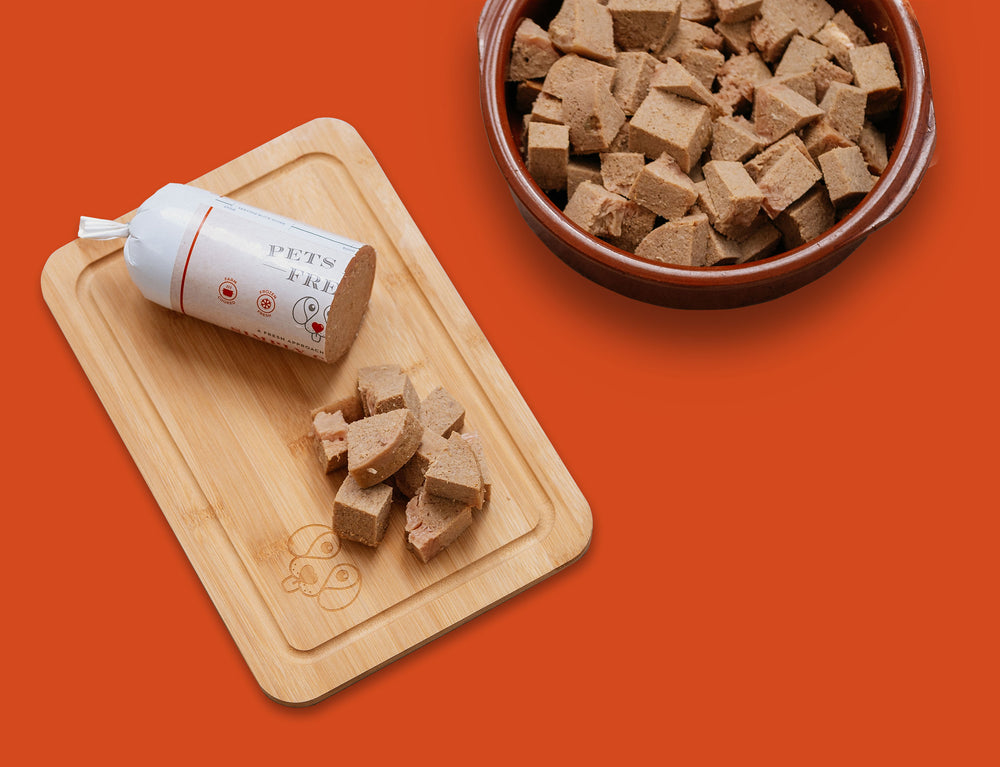Growing problems in the dog food industry
Big commercial dog food brands claim to provide the perfect foods for our dogs based on their size, breed and age. They even providing portion sizes on the back of their colourful packets. However, these can be misleading and, in many instances, incorrect.
As a result, nearly half (46%) of dogs in the UK are classified as overweight or obese. In a long-term study on the connection between our dogs’ body conditions and their health and life spans, it was found that overweight pets were at a much higher risk of developing health problems such as arthritis, diabetes and intestinal issues. Obesity can also reduce the life expectancy of dogs by up to 3 years.

Portion size recommendations on the back of pet food packets are not under any regulations and typically suggest incorrect quantities for us to feed our dogs.
At the other end of the scale, sicknesses caused by nutrient deficiencies and contaminations are being reported at an alarming rate.
Pet food recalls in 2007, due to the product melamine being found in some dry foods, lead to the death of hundreds of pets. Melamine is a chemical used in the production of many adhesives and can cause renal failure in pets. It was introduced into the pet food in contaminated wheat in an effort to boost its apparent protein content.

Pet food recalls have occurred as companies look to cut costs and use cheaper ingredients.
Currently there is a recall of various Hill’s Pet products due to their potentially lethal levels of vitamin D, which can lead to serious health issues in dogs including renal dysfunction.
With all these issues associated with so many commercial dry foods, how come vets are still promoting all these commercial dog foods?
Ignorance or profitable bliss?
There is no doubt that a majority of vets trained to become vets because of their love of animals and desire to help them. There is also no questioning their ability to treat most diseases, injuries and other ailments. They undergo thousands of hours of training, sometimes for up to 8 years, learning the anatomy of our pets and the various ways in which to cure disorders, the symptoms of which they have meticulously learned. What they do not necessarily study in a non biased way is nutritional information.

Are vets recommending food which may not be the best for our dogs?
A quick search on the internet will bring up a number of articles, blogs and book recommendations written by vets which highlight the fact that during their professional training they were not taught, or were taught only briefly, about nutrition in dogs.
Many go on to explain how a large proportion of their education on nutrition came from dog food company representatives. These are employees of the large corporate dog food brands who attend student fairs and go to veterinary practices to encourage vets to back their dog food due to its ‘good quality’ and ‘scientifically developed formula’.

Brands like Royal Canin use terms like 'complete and balanced' to encourage customers to buy their food.
Of course, many vets believe it. This is their only form of dog nutrition ‘teaching’ they receive.
Not all are so ignorant of dog nutrition that their continued sale of commercial brands is purely down to a lack of knowledge though. The money provided by the big companies is a strong incentive to keep pushing these products, despite scientific and their own anecdotal evidence that these commercial dry foods are actually harming our pets. The largest sponsors for Edinburgh University's vetenary courses were outlined in a 2012 freedom of information request:
Do the manufacturers of pet foods provide any funding or sponsorship for students or staff in the form of travel, entertainment, conference costs or any other kind of financial input - if so please release details, exact amounts can be omitted if they are commercially sensitive?
The University has received funding from Hills, Supreme Petfoods Ltd, Dechra and Royal Canin, which contribute a sum that is used to support either veterinary nursing salary costs, or part funding the cost of attendance at a nurse diploma course.
Big brand backing
It is easy to understand why the “benefits” of dry food are so widely spread and praised. Large groups in the UK such as the Pet Food Manufacturers Association (PFMA), who are the leading trade body for the pet food industry and who’s 85 members account for 90% of the market, are focused on providing vets and us pet owners with all the nutritional information we need.
Similarly, the largest vet corporations and charities who provide many of the veterinary services in the UK, are backed by the major commercial kibble brands. The PDSA, who are a veterinary charity which provide low-cost and free treatment to people receiving state support and receive funding through donations, supply Hill’s kibble in all its many forms. The very same brand which is currently undergoing a recall of some of its dog food due to its potential to cause renal failure in dogs.
The collusion of vets and commercial brands is quite staggering. Although the practices may not have names like ‘Pedigree Veterinary Care’ or ‘Royal Canin Vets’, the parent company behind these brands, Mars Inc., operates the U.S.’s biggest veterinary service, which is now acquiring veterinary properties and services around the world.

Mars Petcare has experienced rapid expansion recently as it acquires clinics from around the world.
Mars Petcare has expanded its practice to incorporate hundreds of clinics across Europe (the UK included), Japan and Brazil in recent years. Mars is the parent company for many familiar pet food brands such as Royal Canin, IAMS, Whiskas and Pedigree.
Large dog food manufacturers are providing both the information pet owners and vets use to inform them of nutrition, while at the same time running many of the clinics we take our dogs too. It is small wonder then that in this situation, when it comes to asking vets what we should feed our dogs, we are all directed to the same most profitable, high margin, mass produced product, big brand kibble.
Growing realisation
A lot of the vets who have converted from cheap kibbles and tinned foods, take to the internet or books to explain their decision, typically discussing how they were made aware of its adverse effects through personal experiences, be that with their own dogs or dogs they have treated. Initial reservations about alternatives to kibble or commercial wet food quickly disappear when they are confronted by happy, healthy and long living dogs who are not on a kibble diet.
We need to decide for ourselves what diet would most benefit the nutritional needs of our dogs. We must not be sucked in by the clever marketing of commercial dog foods, the rapid spread of misinformation, or the biased advice of financially incentivised vets.


